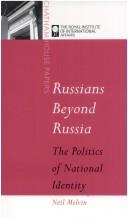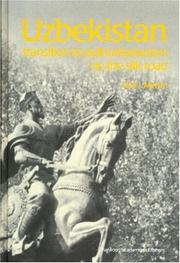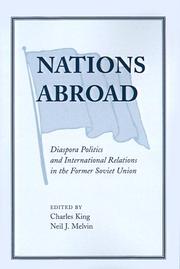| Listing 1 - 10 of 11 | << page >> |
Sort by
|

ISBN: 1855672332 1855672324 Year: 1995 Publisher: London Pinter
Abstract | Keywords | Export | Availability | Bookmark
 Loading...
Loading...Choose an application
- Reference Manager
- EndNote
- RefWorks (Direct export to RefWorks)
Sociology of minorities --- National movements --- Latvia --- Ukraine --- Moldova --- Kazakhstan --- Estonia --- National characteristics, Russian --- Nationalism --- Russians --- Caractéristiques nationales russes --- Nationalisme --- Russes --- Politics and government --- Politique et gouvernement --- Former Soviet republics --- Ex-URSS --- Ethnic relations --- Relations interethniques --- 323.12 <47> --- -Russians --- -Ethnology --- Slavs, Eastern --- Consciousness, National --- Identity, National --- National consciousness --- National identity --- International relations --- Patriotism --- Political science --- Autonomy and independence movements --- Internationalism --- Political messianism --- Russian national characteristics --- Bewegingen tegen bepaalde rassen, nationaliteiten. Politieke acties tegen buitenlanders. Discriminatie--Rusland. Sovjet-Unie --- -CIS countries --- Commonwealth of Independent States countries --- Ex-Soviet republics --- Ex-Soviet states --- Former Soviet states --- New Independent States (Former Soviet republics) --- Newly Independent States (Former Soviet republics) --- NIS (Former Soviet republics) --- National characteristics, Russian. --- Politics and government. --- -Bewegingen tegen bepaalde rassen, nationaliteiten. Politieke acties tegen buitenlanders. Discriminatie--Rusland. Sovjet-Unie --- -Ethnic relations --- 323.12 <47> Bewegingen tegen bepaalde rassen, nationaliteiten. Politieke acties tegen buitenlanders. Discriminatie--Rusland. Sovjet-Unie --- -Russian national characteristics --- Caractéristiques nationales russes --- Ethnology --- Ethnic relations.

ISBN: 9058230295 9058230309 020369256X 1280079657 0203645618 1135287511 9780203645611 9789058230294 9789058230300 9786610079650 661007965X 9781135287511 9781135287467 1135287465 9781135287504 1135287503 9781280079658 9622177956 Year: 2000 Publisher: Amsterdam Harwood Academic
Abstract | Keywords | Export | Availability | Bookmark
 Loading...
Loading...Choose an application
- Reference Manager
- EndNote
- RefWorks (Direct export to RefWorks)
Uzbekistan more than any other country in the area is likely to play a critical role in shaping Central Asia's future. Situated at the heart of the region and sharing borders with all the other Central Asian states, Uzbekistan is the most powerful and populous of the new states of Central Asia. In this volume, the historical origins of Uzbekistan are explored and the range of political, economic and social challenges faced by the country since independence is charted. Particular attention is given to the emergence of highly authoritarian politics in the country and the implications of this
Uzbekistan --- Politics and government --- Politique et gouvernement --- Uzbekistan - Economic conditions - 1991-. --- Russia & Former Soviet Republics --- Regions & Countries - Europe --- History & Archaeology --- #SBIB:328H263 --- Instellingen en beleid: andere GOS-staten --- History --- -Politics and government --- -Economic conditions --- -History. --- Economic conditions --- History.
Book
Year: 1994 Publisher: London Royal institute of international affairs
Abstract | Keywords | Export | Availability | Bookmark
 Loading...
Loading...Choose an application
- Reference Manager
- EndNote
- RefWorks (Direct export to RefWorks)
Book
ISSN: 0966100X Year: 1995 Publisher: London Royal institute of international affairs
Abstract | Keywords | Export | Availability | Bookmark
 Loading...
Loading...Choose an application
- Reference Manager
- EndNote
- RefWorks (Direct export to RefWorks)

ISBN: 0881922536 Year: 1993 Publisher: Portland, OR : Timber Press,
Abstract | Keywords | Export | Availability | Bookmark
 Loading...
Loading...Choose an application
- Reference Manager
- EndNote
- RefWorks (Direct export to RefWorks)
Beginning with the most basic decisions facing fruit growers, this standard text takes the reader step by step through the various stages of fruit growth, from flowering to post-harvest storage. Separate chapters on growth regulators, dormancy and hardiness, and control of pests and diseases provide information any successful grower must master.
HOR Horticulture --- arboriculture --- horticulture --- pomology --- temperate regions --- Fruit-culture. --- Nuts. --- Arboriculture fruitière. --- Noix.
Book
ISBN: 9780198747338 0198747330 Year: 2016 Volume: no. 25 Publisher: Oxford Oxford University Press
Abstract | Keywords | Export | Availability | Bookmark
 Loading...
Loading...Choose an application
- Reference Manager
- EndNote
- RefWorks (Direct export to RefWorks)
"Despite many predictions to the contrary, the Arctic has emerged today as a zone of cooperation. At the core of regional stability and security is an emerging architecture of cooperation focused on the Arctic Council. This new order is based not on military strength or a scramble to control resources, but on the multilateral pursuit of common interests. This book focuses on understanding and explaining the emergence of cooperation in the Arctic through an exploration by leading scholars and experts on the region of a key set of interlinked questions. What constitutes the current form of Arctic governance? What explains the emergence of this form of governance in the Arctic? Which are the emerging dynamics and actors that affect regional governance today? At a time when many regions of the world are facing growing confrontation and even conflict, the authors consider whether the experience of fashioning multilateral, cooperative and peaceful governance in the Arctic offers lessons to other parts of the world? Looking ahead, the volume is designed to explore the sustainability of current governance trends in the Arctic. To what extent is cooperation in the Arctic the result of issues specific to the region today? Are current relationships and institutions durable in the light of emerging competition and even confrontation between key Arctic players elsewhere in the world? What steps might be taken to consolidate cooperation as the central political and security dynamic in the Arctic?"
ARCTIC REGIONS--GOVERNMENT POLICY --- ARCTIC COUNCIL --- ARCTIC REGIONS--NATIONAL SECURITY --- International relations. Foreign policy --- Polemology --- International law --- Arctica --- Climatic changes --- Government policy --- Arctic regions --- Russia --- Scandinavia --- North America --- Politics and government --- Climatic changes - Government policy - Arctic regions --- Arctic regions - Politics and government
Book
Year: 2008 Publisher: Brussels : CEPS Centre for European Policy Studies,
Abstract | Keywords | Export | Availability | Bookmark
 Loading...
Loading...Choose an application
- Reference Manager
- EndNote
- RefWorks (Direct export to RefWorks)
"In July 2007, the European Union initiated a fundamentally new approach to the countries of Central Asia. The launch of the EU Strategy for Central Asia signals a qualitative shift in the Union's relations with a region of the world that is of growing importance as a supplier of energy, is geographically situated in a politically sensitive area - between China, Russia, Iran, Afghanistan and the south Caucasus - and contains some of the most authoritarian political regimes in the world. In this volume, leading specialists from Europe, the United States and Central Asia explore the key challenges facing the European Union as it seeks to balance its policies between enhancing the Union's energy, business and security interests in the region while strengthening social justice, democratisation efforts and the protection of human rights. With chapters devoted to the Union's bilateral relations with Kazakhstan, Uzbekistan, Turkmenistan and Tajikistan and to the vital issues of security and democratisation, 'Engaging Central Asia' provides the first comprehensive analysis of the EU's strategic initiative in a part of the world that is fast emerging as one of the key regions of the 21st century."--BOOK JACKET.

ISBN: 0813337380 081339015X 9780813337388 9780813390154 Year: 1999 Publisher: Boulder, Colo. Westview Press
Abstract | Keywords | Export | Availability | Bookmark
 Loading...
Loading...Choose an application
- Reference Manager
- EndNote
- RefWorks (Direct export to RefWorks)
Ethnology --- Political aspects --- Former Soviet republics --- Ethnic relations --- Political aspects. --- Foreign relations.
Book
ISBN: 9789290797074 929079707X Year: 2008 Publisher: Brussels: Centre for European policy studies,
Abstract | Keywords | Export | Availability | Bookmark
 Loading...
Loading...Choose an application
- Reference Manager
- EndNote
- RefWorks (Direct export to RefWorks)
National security --- Democratization --- European Union Countries --- European Union countries --- Foreign relations --- Foreign economic relations --- -National security --- -Democratization --- -327.5804 --- Democratic consolidation --- Democratic transition --- Political science --- New democracies --- National security policy --- NSP (National security policy) --- Security policy, National --- Economic policy --- International relations --- Military policy --- Electronic information resources --- Government policy --- -European Union countries --- -EU countries --- Euroland --- Europe --- -Foreign economic relations --- -Electronic information resources --- -Foreign relations --- -Europe --- EU countries --- National security - Asia, Central --- Democratization - Asia, Central --- European Union Countries - Foreign relations - Asia, Central --- European Union countries - Foreign economic relations - Asia, Central
Book
Abstract | Keywords | Export | Availability | Bookmark
 Loading...
Loading...Choose an application
- Reference Manager
- EndNote
- RefWorks (Direct export to RefWorks)
| Listing 1 - 10 of 11 | << page >> |
Sort by
|

 Search
Search Feedback
Feedback About UniCat
About UniCat  Help
Help News
News